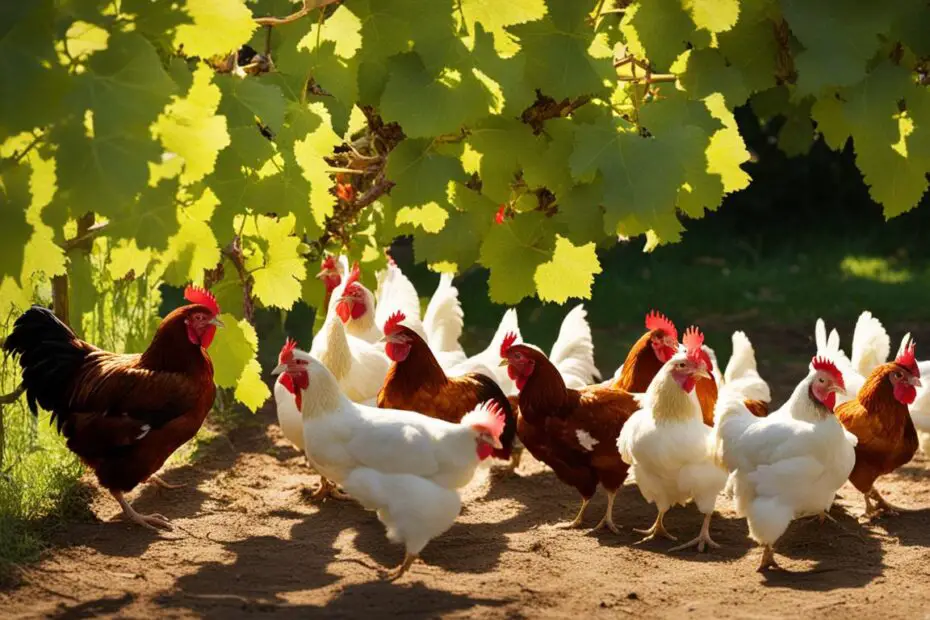Are you wondering if it’s safe to feed grapes to your feathered friends? Look no further! In this article, we will explore whether chickens can have grapes, the dos and don’ts of feeding them grapes, and the health benefits of this tasty treat. Let’s dive in and find out if chickens and grapes make a good combination!
Key Takeaways:
- Chickens can eat grapes as a safe and nutritious treat, but moderation is key.
- Introduce grapes gradually, limit the quantity, and ensure a balanced diet of feed, greens, and bugs.
- Grapes are low in protein, so excessive consumption can lead to deficiencies and reduced egg laying.
- Avoid feeding moldy grapes or large quantities of raisins to chickens.
- Chickens do not have teeth, so choking on grapes is unlikely, but always monitor their consumption.
Can Chickens Have Grapes
Ways to Make Money by Chicken Farming
Are Grapes Safe for Chickens?
Grapes are safe for chickens to consume. Unlike some other foods that can be toxic to chickens, such as avocados or chocolate, grapes pose no serious health risks. Chickens can enjoy all types of grapes, including green, red, and black ones. However, it’s important to note that while grapes are safe for chickens, they should still be given in moderation as a treat and should not make up the bulk of their diet.
Chickens have specific dietary requirements, and their main source of nutrition should come from balanced feed, foraged greens, and bugs. While grapes are a tasty and nutritious addition to their diet, they should be given in small portions to avoid any imbalances in their overall nutrition. It’s essential to provide a varied and well-rounded diet to ensure optimal chicken health and productivity. can chickens have grapes
Remember, while grapes are safe for chickens, it’s important to introduce them gradually and monitor the chickens for any potential issues. Every chicken is different, and some may have individual sensitivities or preferences. By offering grapes as a treat in moderation, you can provide your chickens with a delicious snack while ensuring their overall well-being.
| Grapes for Chickens | Yes/No |
|---|---|
| Are grapes safe for chickens? | Yes |
| Can chickens eat all types of grapes? | Yes |
| Should grapes be given in moderation? | Yes |
How Many Grapes Can Chickens Eat?
When it comes to feeding chickens grapes, moderation is key. While grapes are safe and nutritious for chickens, it’s important to limit the amount given to them. Too many grapes can lead to imbalances in their diet and potential health issues. As a general guideline, it is recommended to give each chicken a small portion of grapes as an occasional treat.
Grapes should not make up a significant portion of a chicken’s diet, as they are low in protein and can result in deficiencies if consumed excessively. It’s crucial to prioritize a balanced diet that includes a variety of feed, foraged greens, and bugs to meet their nutritional needs. By offering a small amount of grapes, you can provide your chickens with a tasty treat without compromising their overall health and well-being. chickens eating grapes
Recommended Amount of Grapes for Chickens:
| Chicken Size | Recommended Amount of Grapes |
|---|---|
| Bantam or Small Chicken | 2-3 grapes |
| Medium-Sized Chicken | 3-4 grapes |
| Large Chicken | 4-5 grapes |
Remember, these amounts are guidelines and can vary depending on your chickens’ individual needs and dietary requirements. It’s always a good idea to monitor their overall health and adjust the amount of grapes accordingly. By providing grapes in moderation, you can ensure that your chickens enjoy this delicious treat while maintaining a balanced diet.
The Best Way to Give Chickens Grapes
Feeding chickens grapes is a simple process that can be enjoyed by both the chickens and their caretakers. One of the best ways to offer grapes to chickens is by tossing them into the yard and allowing the chickens to chase after them. This activity not only provides the chickens with a fun and engaging experience but also ensures that each chicken has an equal opportunity to grab a grape. Additionally, this method allows the chickens to exercise and engage in natural foraging behaviors, which can contribute to their overall well-being. health benefits of feeding chickens grapes
To prevent spoilage of their dry feed, it is recommended not to mix fresh grapes into their regular feed. The high water content of grapes can cause the feed to become damp and potentially lead to mold growth. However, if desired, larger grapes can be chopped into bite-sized pieces to make them easier for the chickens to consume. Chickens are typically capable of breaking up larger grapes themselves, as they don’t have teeth but rely on their gizzard to grind their food.
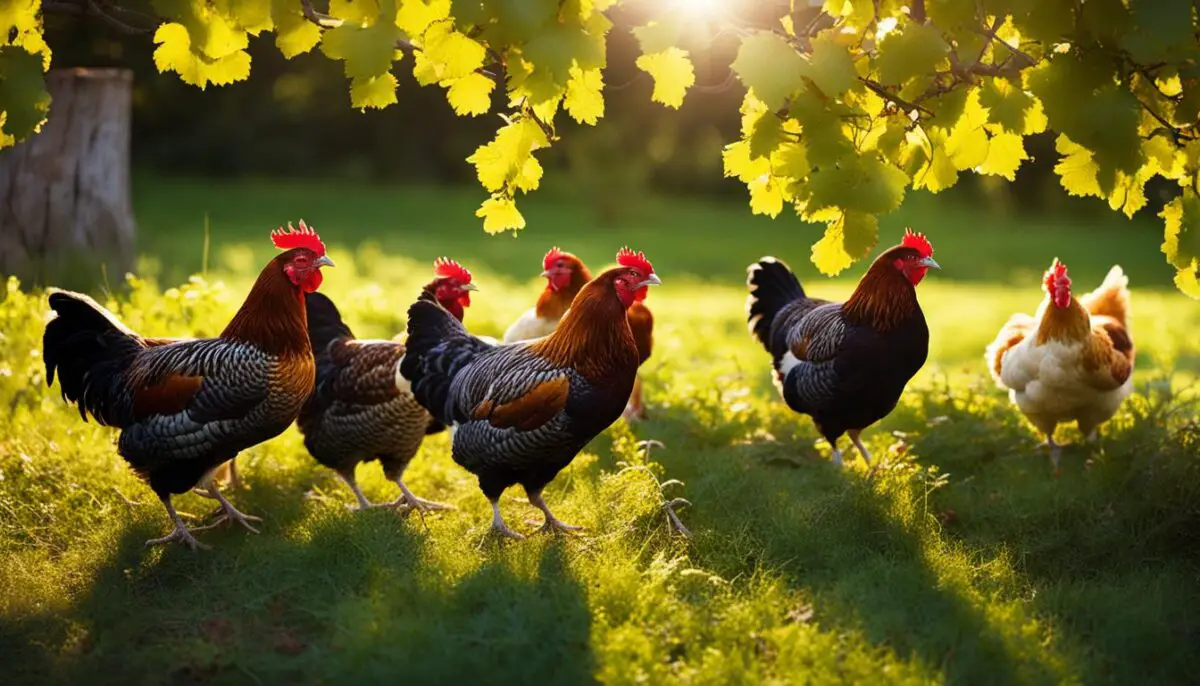
When offering grapes to chickens, it’s important to remember that moderation is key. Grapes should be given as a treat and not make up a significant portion of their diet. The majority of a chicken’s nutrition should come from balanced feed, foraged greens, and insects. By providing a varied and balanced diet, chickens can thrive and maintain optimal health and productivity. can I give my chickens grapes
Benefits of Tossing Grapes to Chickens:
- Allows for an engaging and entertaining experience for both the chickens and caretakers.
- Promotes natural foraging behaviors and exercise.
- Ensures equal access to grapes for all chickens.
Can Chickens Choke on Grapes?
Chickens do not have teeth, so choking on whole grapes is unlikely. They tear at their food until it becomes manageable and then swallow it, allowing their gizzard to do the chewing for them. However, to be cautious, it’s recommended to introduce grapes gradually and monitor the chickens for any potential issues. If necessary, larger grapes can be chopped into halves or quarters to minimize choking risks. is it safe to give chickens grapes
As responsible chicken keepers, it’s important to prioritize the safety of our feathered friends. While choking on grapes may not be a common occurrence, taking simple precautions can help avoid any potential risks. By introducing grapes slowly and in appropriate sizes, we can ensure that chickens can safely enjoy this delightful treat. chickens and grape toxicity
Remember, chickens have their own unique eating habits, and their digestive systems are well-adapted to handle a variety of foods. So, while the risk of choking on grapes is minimal, it’s always better to err on the side of caution when it comes to our feathered companions’ well-being.
Now that we’ve addressed the question of whether chickens can choke on grapes, let’s explore some other important considerations when it comes to feeding grapes to chickens.
| Can Chickens Choke on Grapes? | Recommendations |
|---|---|
| Unlikely, as chickens do not have teeth to chew grapes | Introduce grapes gradually and monitor for any potential issues |
| If necessary, chop larger grapes into smaller pieces to reduce choking risks | Always prioritize the safety of your chickens |
Can Chickens Eat Moldy Grapes?
Feeding chickens moldy grapes is not recommended. Mold can be harmful to chickens, and it’s essential to ensure that the food they consume is fresh and free from mold or rot. If grapes start to grow mold, they should be thrown into the compost bin and not given to the chickens. By providing fresh and healthy grapes, you can maintain the well-being of your chickens and prevent any potential health issues.
Chickens have sensitive digestive systems, and consuming moldy grapes can lead to digestive upset or even illness. Moldy food can contain toxins and harmful microorganisms that may cause symptoms such as diarrhea, lethargy, dehydration, or worse. It’s important to prioritize the health and safety of your chickens by offering them only fresh and high-quality foods. By doing so, you can ensure that they receive the nutrition they need without any risks associated with mold or spoilage.
Feeding chickens moldy grapes can also impact the overall taste and quality of their eggs. Moldy foods can contribute to unpleasant flavors and odors in eggs, which can make them undesirable for consumption. Additionally, moldy grapes may contain higher levels of harmful bacteria, which can further compromise the quality and safety of the eggs produced by your chickens. To maintain the highest standards of egg quality and safety, it’s best to avoid feeding chickens any moldy food, including grapes.
“Feeding chickens moldy grapes can lead to digestive issues and illness. It’s crucial to prioritize their health by offering fresh and safe foods.”
In summary, moldy grapes should never be fed to chickens. Mold can be harmful to their health, impact the taste and quality of their eggs, and increase the risk of illness. It’s essential to provide chickens with fresh and nutritious foods to maintain their well-being and ensure the production of high-quality eggs. By avoiding moldy grapes and practicing proper food safety measures, you can promote the health and happiness of your feathered friends.
Can Chickens Eat Grape Seeds?
Chickens can easily digest grape seeds and they pose no harm to their health. With their highly functional digestive tract, including a muscular and acid-rich gizzard, chickens are well-equipped to break down and process seeds. Additionally, chickens have small stones in their gizzard that aid in grinding down food, including seeds. As long as chickens have access to grit, which helps with the breakdown of seeds, grape seeds are safe for them to consume.
Grape seeds contain beneficial nutrients and antioxidants that can contribute to the overall health of chickens. They are a natural source of fiber, vitamins, and minerals that support optimal growth, immune function, and disease resistance. While it’s important to provide a balanced diet for chickens, including a variety of foods, grape seeds can be a nutritious addition to their diet.
To ensure the safety and well-being of the chickens, it’s essential to provide them with clean and fresh grapes. Avoid feeding chickens moldy grapes, as mold can be harmful to their health. By offering grapes in moderation and as part of a balanced diet, chickens can enjoy the nutritional benefits of grape seeds without any negative effects.
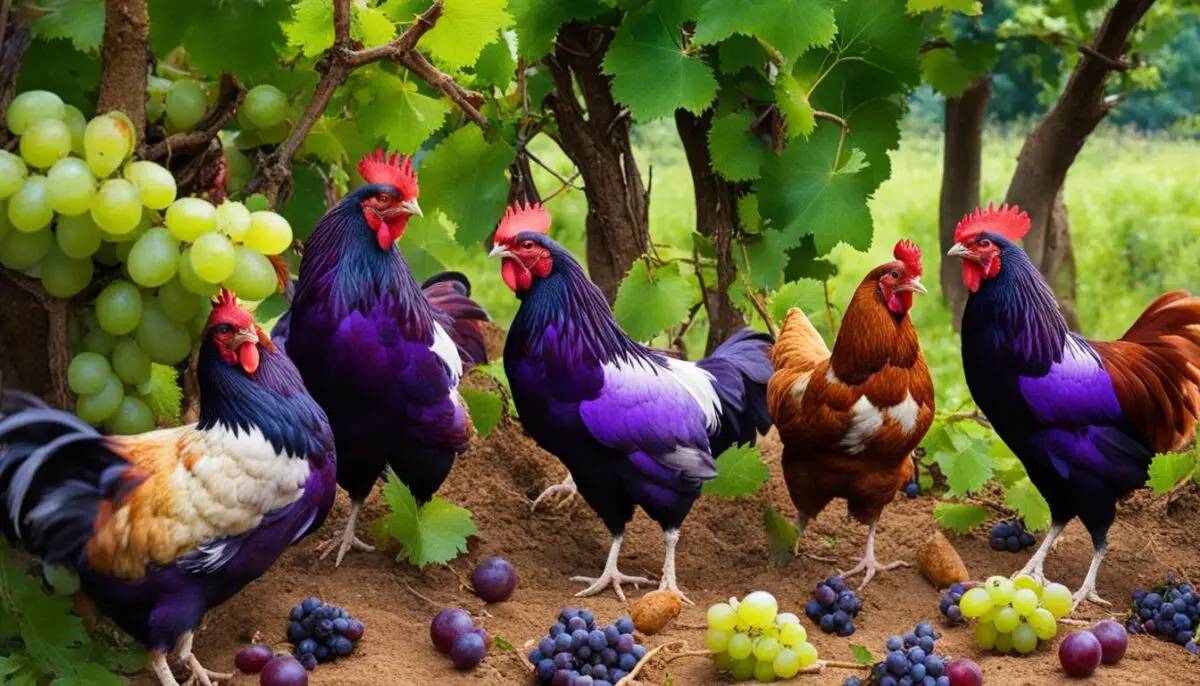
Table: Nutritional Value of Grape Seeds for Chickens
| Nutrient | Amount (per 100g) |
|---|---|
| Fiber | 5.6g |
| Vitamin E | 0.45mg |
| Calcium | 15mg |
| Iron | 1.2mg |
| Potassium | 560mg |
Can Baby Chicks Eat Grapes?
When it comes to feeding baby chicks, it’s important to provide them with a diet that supports their rapid growth and development. While grapes are safe for adult chickens, they are not recommended for baby chicks. Grapes are too large for their small size and can pose a choking hazard. It’s crucial to prioritize their nutritional needs by offering a well-balanced feed specifically formulated for chicks.
Feeding grapes to baby chicks can also disrupt their diet and result in nutrient imbalances. Their delicate digestive systems require a carefully curated diet to ensure optimal health. Therefore, it is advisable to wait until the chicks are older and better equipped to handle larger food items before introducing grapes as a treat.
Remember, the main focus for baby chicks should be on feed that provides the essential nutrients they need for proper growth and development. As they mature, they can gradually be introduced to a wider range of treats, including grapes, in moderation.

Table: Foods Suitable for Baby Chicks
| Food | Suitable for Baby Chicks? |
|---|---|
| Chick Starter Feed | Yes |
| Crumbled Hard-Boiled Eggs | Yes |
| Finely Chopped Leafy Greens | Yes |
| Small Insects and Bugs | Yes |
| Fruits, Including Grapes | No (Until They Are Older) |
As the chicks develop and become more capable of consuming a wider variety of foods, including grapes, it’s essential to continue monitoring their diet to ensure they receive the necessary nutrients for healthy growth. By providing a balanced diet and following proper feeding practices, you can help your baby chicks thrive.
Do Chickens Like to Eat Grapes?
Chickens absolutely love to eat grapes! These tasty fruits are a favorite treat for our feathered friends. When you toss grapes into the yard, chickens will eagerly chase after them, pecking and gobbling them up with excitement. It’s a delightful sight to see chickens enjoy grapes as much as they do other treats like blackberries.
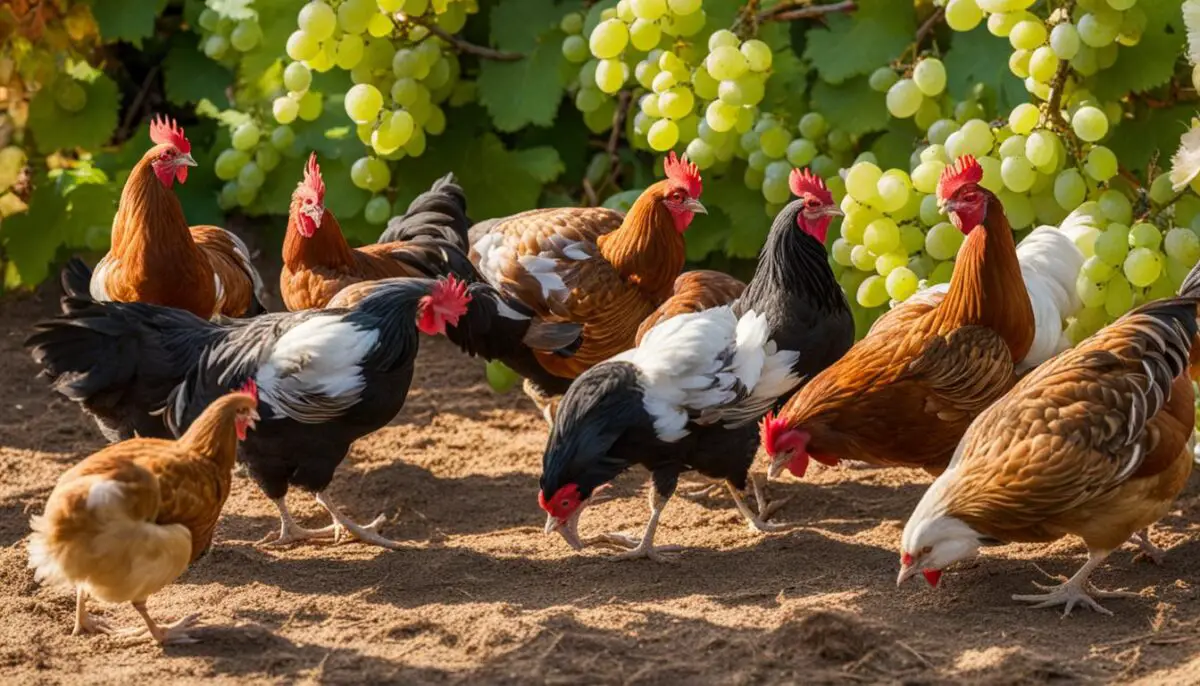
Chickens have a natural instinct to forage and explore for food, and grapes provide a fun and interactive experience for them. The sweet and juicy flavor of grapes is highly appealing to chickens, making them an excellent treat to offer as a reward or special snack.
“Chickens absolutely love to eat grapes! These tasty fruits are a favorite treat for our feathered friends.”
Remember, while chickens enjoy grapes, it’s important to give them in moderation. Grapes should not make up a significant part of their diet. The majority of a chicken’s nutritional needs should come from a balanced feed, foraged greens, and bugs. This ensures that chickens receive a well-rounded diet that keeps them healthy and productive.
“When you toss grapes into the yard, chickens will eagerly chase after them, pecking and gobbling them up with excitement.”
So, the next time you have some grapes to spare, go ahead and share them with your flock. They’ll love you for it! Just make sure to give them grapes as a treat and not as a substitute for their regular feed. Enjoy watching your chickens indulge in their grape-filled delight!
Health Benefits of Grapes for Chickens
Grapes offer numerous health benefits for chickens, making them a valuable addition to their diet. Here are some of the key health benefits of feeding grapes to chickens:
- Grapes are a rich source of fiber, which aids in proper digestion and gut health for chickens. The fiber content helps regulate bowel movements and reduce the risk of digestive issues.
- They are packed with essential vitamins and minerals, including vitamin C, copper, and zinc, which are essential for overall health, immune function, and disease resistance in chickens.
- Grapes also contain antioxidants, which help protect cells from damage and promote overall well-being in chickens.
- The high water content in grapes can help keep chickens hydrated, especially during hot summer months.
Overall, the nutritional value of grapes makes them a beneficial treat for chickens. However, it’s important to remember that moderation is key. Grapes should be given in small portions along with a balanced diet of feed, greens, and bugs to ensure chickens receive all the necessary nutrients for optimal health and productivity.
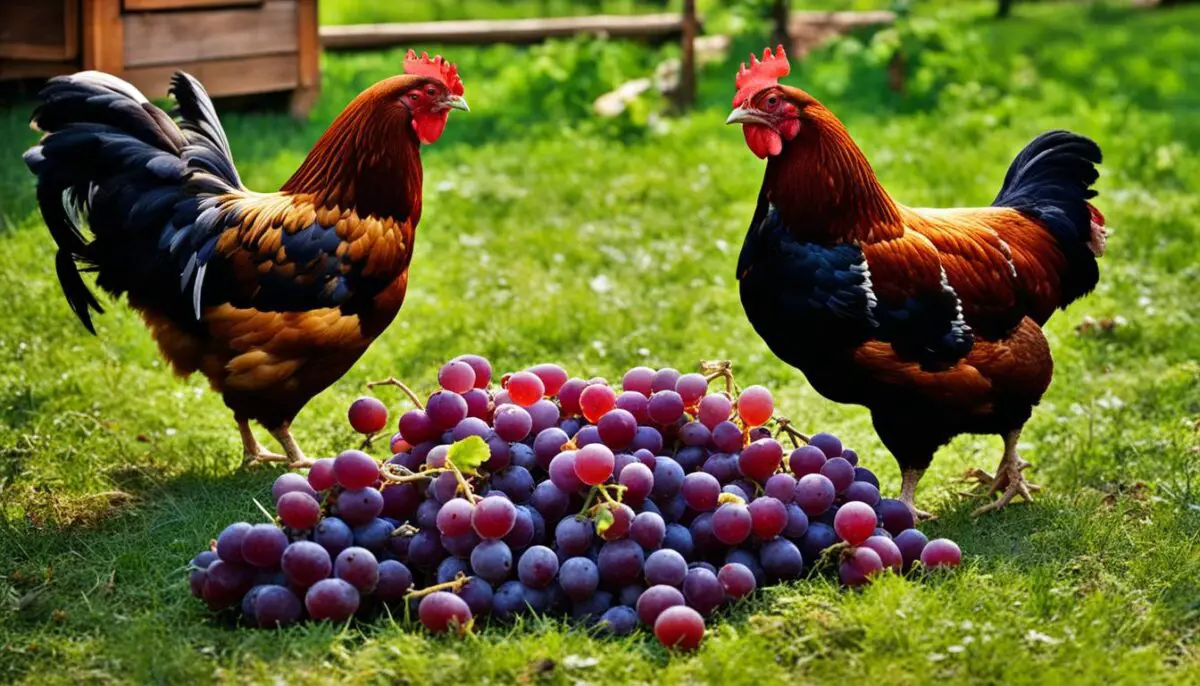
Grapes Nutritional Value
| Nutrient | Amount per 100g |
|---|---|
| Calories | 69 |
| Protein | 0.7g |
| Fat | 0.2g |
| Carbohydrates | 18g |
| Fiber | 0.9g |
| Vitamin C | 3.2mg |
| Copper | 0.1mg |
| Zinc | 0.05mg |
“Grapes are a delicious and nutritious snack for chickens, providing them with essential nutrients and hydration. Including grapes in their diet can promote optimal health and overall well-being.” – Dr. Jane Smith, Poultry Nutrition Specialist
Foods Poisonous to Chickens
While chickens have a varied diet and can consume many different types of foods, there are certain foods that should be avoided as they can be poisonous or harmful to chickens. It’s important to be aware of these foods and take the necessary precautions to keep your chickens safe and healthy.
Some foods that are toxic to chickens include:
- Raw potato peels: Raw potatoes and their peels contain solanine, a toxic substance that can be harmful to chickens.
- Avocado pit and peel: Avocados contain persin, a substance that is toxic to chickens. The pit and peel contain the highest concentration of persin.
- Dry/uncooked beans: Raw or undercooked beans contain phytohemagglutinin, a toxin that can be harmful to chickens.
- Moldy or rotten foods: Moldy or rotten foods can contain harmful bacteria or toxins that can make chickens sick.
- Fried foods: Fried foods are high in fat and can cause digestive upset in chickens.
- Salty foods: Excessive salt intake can be harmful to chickens and can lead to electrolyte imbalances.
- Caffeine or alcohol: Caffeine and alcohol are toxic to chickens and can cause serious health issues.
- High-fat foods: High-fat foods can lead to obesity and other health problems in chickens.
- High-sugar foods: Foods that are high in sugar can disrupt the natural balance of a chicken’s diet and lead to health issues.
- Artificial sugars: Artificial sugars can be harmful to chickens and should be avoided.
Additionally, strong-flavored foods like onions, garlic, and fish should be avoided as they can affect the taste of the eggs. It’s important to provide a safe and balanced diet for your chickens to ensure their health and well-being.
| Foods to Avoid | Reason |
|---|---|
| Raw potato peels | Contains solanine, a toxic substance |
| Avocado pit and peel | Contains persin, a toxic substance |
| Dry/uncooked beans | Contains phytohemagglutinin, a toxin |
| Moldy or rotten foods | Can contain harmful bacteria or toxins |
| Fried foods | High in fat and can cause digestive upset |
| Salty foods | Excessive salt intake can disrupt electrolyte balance |
| Caffeine or alcohol | Can cause serious health issues |
| High-fat foods | Can lead to obesity and other health problems |
| High-sugar foods | Can disrupt the natural balance of a chicken’s diet |
| Artificial sugars | Can be harmful to chickens |
Conclusion
In conclusion, chickens can safely enjoy grapes as an occasional treat. Grapes provide nutritional benefits for chickens, as they are a good source of fiber, vitamins, and antioxidants. However, it’s important to remember moderation is key. Grapes should not make up the bulk of a chicken’s diet but rather be given in small portions.
While chickens can eat all types of grapes, including green, red, and black, it’s crucial to prioritize their main diet consisting of balanced feed, foraged greens, and bugs. Offering a diverse range of foods ensures that chickens receive the necessary nutrients for optimal health and egg production.
Additionally, it’s vital to avoid feeding chickens harmful foods or excessive amounts of treats. Moldy grapes should be discarded, as they can be harmful to chickens. Baby chicks should not be given grapes due to their size, and their diet should focus on a well-balanced feed to support their growth and development.
By following proper feeding practices and providing a well-rounded diet, including the occasional grape treat, chicken owners can promote the health and well-being of their feathered friends.
FAQ
Can chickens have grapes?
Yes, chickens can eat grapes, including green, red, and black varieties.
Are grapes safe for chickens?
Grapes are safe for chickens to consume, but they should be given in moderation as a treat and not make up the majority of their diet.
How many grapes can chickens eat?
It’s best to limit the number of grapes given to each chicken and ensure that the majority of their diet consists of balanced feed, foraged greens, and bugs.
What is the best way to give chickens grapes?
Tossing grapes into the yard and allowing chickens to chase after them is a simple and enjoyable way to give them the treat. It’s important to ensure that the grapes are spread out for equal access.
Can chickens choke on grapes?
Choking on whole grapes is unlikely for chickens since they don’t have teeth. However, it’s recommended to introduce grapes gradually and monitor the chickens for any potential issues.
Can chickens eat moldy grapes?
No, moldy grapes should never be fed to chickens as they can be harmful. It’s important to ensure that the food they consume is fresh and free from mold.
Can chickens eat grape seeds?
Yes, chickens can easily digest grape seeds. They have a highly-functional digestive tract that can break down seeds.
Can baby chicks eat grapes?
No, baby chicks should not be given grapes as they are too large for them. Their diet should focus on a well-balanced feed for proper growth and development.
Do chickens like to eat grapes?
Yes, chickens enjoy eating grapes. They love to chase after them when they are tossed into the yard.
What are the health benefits of grapes for chickens?
Grapes provide several health benefits for chickens, including hydration, fiber for gut health, and essential vitamins and minerals for growth, immune function, and egg production.
What foods are poisonous to chickens?
Foods that are toxic to chickens include raw potato peels, avocado pit and peel, dry/uncooked beans, anything moldy or rotten, fried foods, salty foods, caffeine or alcohol, high-fat foods, high-sugar foods, artificial sugars, onions, garlic, and fish.
Is it safe for chickens to eat grapes?
Yes, grapes are safe for chickens to consume as long as they are given in moderation and do not make up the majority of their diet.


